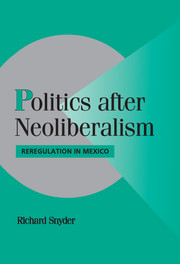Book contents
- Frontmatter
- Contents
- List of Illustrations
- Acknowledgments
- Acronyms
- Part I The Framework and Comparative Analysis
- Part II The Cases
- 3 REMAKING CORPORATISM FROM BELOW: A PARTICIPATORY POLICY FRAMEWORK IN OAXACA
- 4 WHEN CORPORATISM AND DEMOCRACY COLLIDE: AN EXCLUSIONARY POLICY FRAMEWORK IN GUERRERO
- 5 PEASANTS AGAINST OLIGARCHS: STALEMATE AND TRANSITION TO A PARTICIPATORY POLICY FRAMEWORK IN CHIAPAS
- 6 OLIGARCHS AS THE DOMINANT FORCE: AN EXCLUSIONARY POLICY FRAMEWORK IN PUEBLA
- Part III Conclusion
- References
- Index
3 - REMAKING CORPORATISM FROM BELOW: A PARTICIPATORY POLICY FRAMEWORK IN OAXACA
Published online by Cambridge University Press: 03 December 2009
- Frontmatter
- Contents
- List of Illustrations
- Acknowledgments
- Acronyms
- Part I The Framework and Comparative Analysis
- Part II The Cases
- 3 REMAKING CORPORATISM FROM BELOW: A PARTICIPATORY POLICY FRAMEWORK IN OAXACA
- 4 WHEN CORPORATISM AND DEMOCRACY COLLIDE: AN EXCLUSIONARY POLICY FRAMEWORK IN GUERRERO
- 5 PEASANTS AGAINST OLIGARCHS: STALEMATE AND TRANSITION TO A PARTICIPATORY POLICY FRAMEWORK IN CHIAPAS
- 6 OLIGARCHS AS THE DOMINANT FORCE: AN EXCLUSIONARY POLICY FRAMEWORK IN PUEBLA
- Part III Conclusion
- References
- Index
Summary
The politics of reregulation in Oaxaca began with a surprising appointment. In late 1988, as efforts to deregulate coffee were intensifying at the national level, the governor of Oaxaca invited Fausto Cantú Peña to coordinate his government's policy for the state's coffee sector. Cantú, who had directed INMECAFE during the mid-1970s, was a relic of a bygone period of nationalist-populist policies. He had orchestrated INMECAFE's transformation from a small federal agency with limited capacities to a giant enterprise with more than 7,000 employees. To the neoliberal technocrats who dominated national economic policy during the late 1980s, Cantú represented the worst excesses of the statist policies of prior decades: bloated, corrupt bureaucracy; a leviathan, paternalistic state; and irrational, antimarket government intervention.
The policy environment in Oaxaca differed dramatically from the environment at the national level, however. Oaxaca's governor, Heladio Ramírez López (1986–92), welcomed individuals like Cantú, whose nationalist ideology and talent for state building were out of step with the national-level policy of neoliberalism and state shrinking. In Ramírez's administration, advisers with strong nationalist-populist credentials wielded powerful influence.
Cantú's vision for Oaxaca's coffee sector was to build a new set of centralized government institutions to regulate the marketing of coffee. These regulatory institutions would be accompanied by corporatist mechanisms of controlled interest representation to manage producers' demands. In short, he sought to create a mini-INMECAFE, resurrecting on a smaller, subnational scale the regulatory scheme he had designed at the national level fifteen years earlier.
- Type
- Chapter
- Information
- Politics after NeoliberalismReregulation in Mexico, pp. 53 - 96Publisher: Cambridge University PressPrint publication year: 2001



